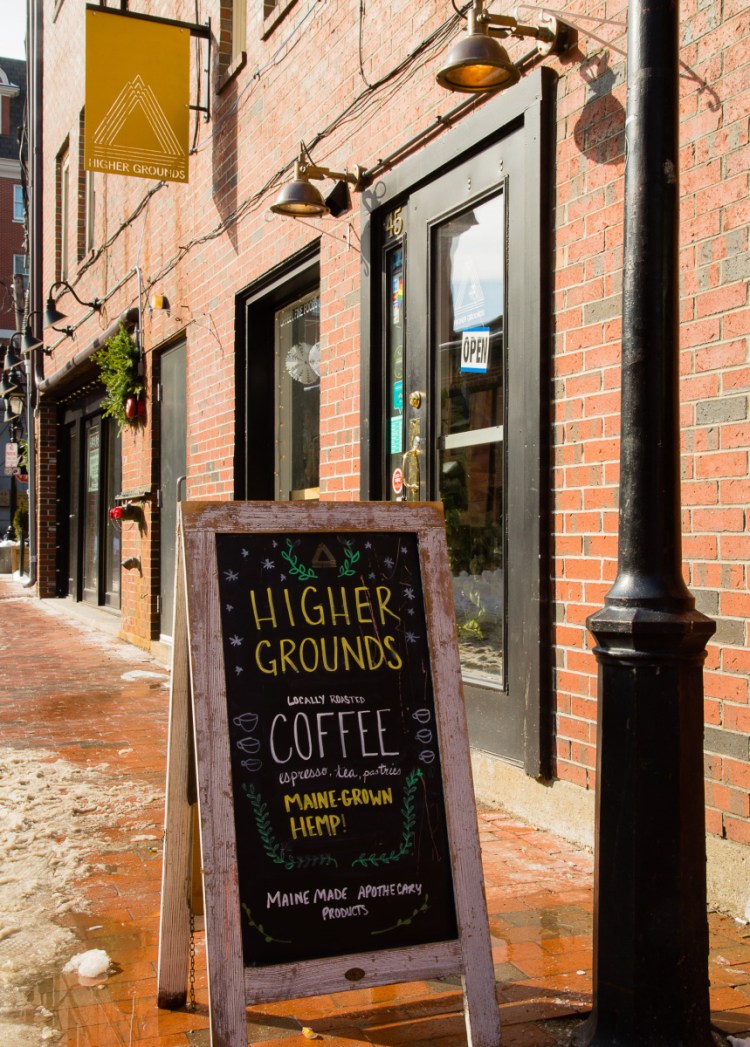When Mark Barnett opened Higher Grounds on Wharf Street in Portland in 2017, he knew that someday he may be able to sell marijuana alongside locally roasted coffee, organic teas and apothecary products.
Now Barnett’s dream of offering customers a “full suite of plant alternatives” hinges on an amendment to zoning rules proposed for marijuana retail establishments in Portland.
“I would have to shut that down completely based on their initial rules,” the 35-year-old Auburn resident said of his current product line.
The City Council is scheduled to vote Monday to establish zoning rules that will cover everything from the size and location of marijuana grow to testing and retail stores. The current proposal from the staff prohibits marijuana retailers from selling any food or drink that does not contain marijuana. And that doesn’t sit well with some councilors and budding marijuana entrepreneurs looking for ways to stand out in what’s expected to be a competitive market.
City Councilor Belinda Ray is offering an amendment to undo that prohibition, which was recommended to avoid customer confusion and prevent illegal social clubs from forming.
“State law requires these things are clearly labeled and the price will certainly be an indication – your $20 brownie might not be a regular brownie,” Ray said. She added that marijuana retailers will have to remain vigilant to prevent on-site use.
Medical use of marijuana has been allowed in Maine since 2010. Portland became the first city on the East Coast to endorse recreational use of marijuana via a citywide referendum back in 2013, though it was a largely symbolic vote since police continued to enforce state law.
In 2016, voters statewide endorsed recreational marijuana and the state has been plodding its way through rulemaking ever since.
Zoning is just one step in Portland’s journey in rolling out marijuana retail stores. The city also must adopt an adult-use licensing and permitting process. A City Hall representative said the staff expects to present those recommendations to the Economic Development Committee or the full council in late spring or early summer.
Local officials are also waiting on the state to finalize its rules. The process is facing new delays after the state pulled out of a contract with a consultant.
Anne Torregrossa, a city attorney, told councilors at a workshop last month that the staff recommended limiting sales in marijuana retail stores to only products that contained the drug for a variety of reasons. It was concerned that customers, including minors, might get confused and accidentally purchase a marijuana product.
Torregrossa said the staff was also concerned about places like cafes, where people would be drinking coffee and tea, and possibly consuming baked goods infused with marijuana, in violation of state law. Such a scenario would make it almost impossible to enforce a state prohibition on marijuana social clubs.
Ray said her amendment to allow the sale of products not infused with marijuana would put Portland in line with state rules, as well as rules adopted by South Portland. Her amendment also would only allow people age 21 and over in stores that sell marijuana products.
“I thought it would be good for Portland to be in sync with state law,” she said.
Barnett, the coffee shop owner who is also part of the Maine Craft Cannabis Association, a small group of cannabis enthusiasts, said he’s pleased with the direction of Portland’s zoning rules. Although he might not agree with all of the rules, he commended the city staff for addressing concerns voiced by small-business owners, who worried about being shut out of the market. He said initial rules being considered would have eliminated the Forest Avenue corridor for retail and prohibited any marijuana retailer from having windows.
“You shouldn’t be creating barriers to entry for people most likely to keep their dollars back here at home,” Barnett said. “We have tried to keep that at the forefront of Portland’s rulemaking process.”
A buy local advocate, Barnett said being able to continue selling coffee and other goods is an important part of his business model. Retail marijuana is expected to be a competitive business, so it’s important to have diverse revenue streams and other incentives for customers to come into your store, he said.
Entrepreneurs like Barnett hope to create a craft marijuana industry, akin to the craft brewing, restaurant, food and nightlife scenes that have landed Portland on national radar as a place to live, work and play. He hopes councilors buy into that vision.
“It’s the freedom to explore that has allowed these people to create that,” Barnett said of Portland’s creative economy. “It has been a huge boon for the city of Portland. Why are we treating cannabis any differently?”
Copy the Story Link
Send questions/comments to the editors.




Success. Please wait for the page to reload. If the page does not reload within 5 seconds, please refresh the page.
Enter your email and password to access comments.
Hi, to comment on stories you must . This profile is in addition to your subscription and website login.
Already have a commenting profile? .
Invalid username/password.
Please check your email to confirm and complete your registration.
Only subscribers are eligible to post comments. Please subscribe or login first for digital access. Here’s why.
Use the form below to reset your password. When you've submitted your account email, we will send an email with a reset code.